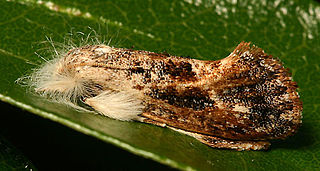
Acrolophidae is a family of moths in the order Lepidoptera. The family comprises the burrowing webworm moths and tube moths. The family holds about 300 species in five genera, which occur in the wild only in the New World. It is closely related to the Tineidae family.

In telecommunications, 5G is the fifth generation technology standard for broadband cellular networks, which cellular phone companies began deploying worldwide in 2019, and is the planned successor to the 4G networks which provide connectivity to most current cellphones. 5G networks are predicted to have more than 1.7 billion subscribers worldwide by 2025, according to the GSM Association. Like its predecessors, 5G networks are cellular networks, in which the service area is divided into small geographical areas called cells. All 5G wireless devices in a cell are connected to the Internet and telephone network by radio waves through a local antenna in the cell. The main advantage of the new networks is that they will have greater bandwidth, giving higher download speeds, eventually up to 10 gigabits per second (Gbit/s). Due to the increased bandwidth, it is expected the networks will not exclusively serve cellphones like existing cellular networks, but also be used as general internet service providers for laptops and desktop computers, competing with existing ISPs such as cable internet, and also will make possible new applications in internet of things (IoT) and machine to machine areas. 4G cellphones are not able to use the new networks, which require 5G enabled wireless devices.
Amydria abscensella is a moth of the family Acrolophidae. It is found in Venezuela.
Amydria anceps is a moth of the family Acrolophidae. It is found in Mexico.
Amydria apachella is a moth of the family Acrolophidae. It is found in North America, including Arizona.
Amydria arizonella is a moth of the family Acrolophidae. It is found in North America, including Arizona and South Carolina.
Amydria brevipennella is a moth of the family Acrolophidae. It is found in North America, including Florida, Maryland, North Carolina, Ohio, Tennessee, Virginia and West Virginia.
Amydria clemensella is a moth of the family Acrolophidae. It is found in North America.
Amydria confusella is a moth of the family Acrolophidae. It is found in North America, including California and Illinois.
Amydria curvistrigella is a moth of the family Acrolophidae. It is found in North America, including California and Arizona.
Amydria dyarella is a moth of the family Acrolophidae. It is found in North America, including Alabama, Arkansas, Florida, Indiana, Kentucky, Louisiana, Maryland, Mississippi, North Carolina, Ohio, Texas and West Virginia.

Amydria effrentella is a moth of the family Acrolophidae. It is found in North America, including Alabama, Arizona, Arkansas, California, Georgia, Illinois, Indiana, Kentucky, Maryland, Massachusetts, Minnesota, Mississippi, Nevada, New Brunswick, New Jersey, New York, North Carolina, Ohio, Quebec, Saskatchewan, South Carolina, Tennessee, Utah, West Virginia and Wisconsin.
Amydria margoriella is a moth of the family Acrolophidae. It is found in North America, including Florida, Kentucky, Ohio and Texas.
Amydria meridionalis is a moth of the family Acrolophidae. It is found in Costa Rica.
Amydria muricolor is a moth of the family Acrolophidae. It is found in Mexico.
Amydria obliquella is a moth of the family Acrolophidae. It is found in North America, including Arizona, California, Manitoba, Maryland, New Mexico, Saskatchewan and Texas.
Amydria onagella is a moth of the family Acrolophidae. It is found in North America, including California.
Amydria pauculella is a moth of the family Acrolophidae. It is found in Venezuela.
Amydria pogonites is a moth of the family Acrolophidae. It is found in Mexico.
Amydria taracta is a moth of the family Acrolophidae. It is found in Guatemala.


